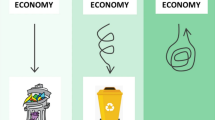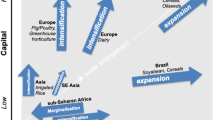Abstract
Dutch society is changing, and so is its attitude towards animal welfare. Meat retailers respond by laying down minimum-quality criteria for farmers who wish to supply to supermarkets—forcing them to either aim for higher quality or lose their market. Policy-wise this is a top-down measure that leads to a redistribution of markets. From farmer perspective, a transition with more individual freedom to adapt seems more sustainable. By means of an existing agent-based model, this paper investigates two policies for such a market switch: immediate transition—‘sudden death’ (SD)—versus gradual change—‘graceful degradation’ (GD). Both farmers and available markets are modelled as agents. Each farmer has a collection of multi-dimensional information items, under certain conditions exchangeable with other farmers in his network, representing his knowledge and skills. Information items are a farmer’s key to the market, as market criteria are expressed in terms of information requirements. We tested the effect of SD and GD policies on market redistribution, varying markets sets, available information, and network size. Results show that policy does not matter for final market redistribution, but that GD policy indeed allows more farmers to keep away from poverty, especially in information-poor situations. With GD, we see a temporarily higher inequality of income distribution over individuals (Gini) worth exploring. Studying transitions with respect to both individuals and the system as a whole may be promising for other domains as well. The model is applicable to any situation that implies aligning heterogeneous suppliers with a multi-dimensional demand spectrum.






Similar content being viewed by others
References
Ahrweiler P, Pyke A, Gilbert N (2004) Simulating knowledge dynamics in innovation networks (SKIN). In: Leombruni R, Richiardi M (eds) Industry and labor dynamics: the agent-based computational economics approach. World Scientific Press, Singapore
Bakker ED, Dagevos H (2012) Reducing meat consumption in today’s consumer society: questioning the citizen-consumer gap. J Agric Environ Ethics 25(6):877–894
Bauman Z (2009) Does ethics have a chance in a world of consumers? Harvard University Press, Cambridge
Bock BB, van Huik MM (2007) Animal welfare: the attitudes and behaviour of European pig farmers. Br Food J 109(11):931–944. doi:10.1108/00070700710835732
Bos AP, Spoelstra SF, Groot Koerkamp PWG, De Greef KH, Van Eijk ONM (2011) Reflexive design for sustainable animal husbandry: mediating between niche and regime. In: Spaargaren G, Loeber A, Oosterveer P (eds) Food practices in transition. Routledge, London
Broom DM (2010) Animal welfare: an aspect of care, sustainability, and food quality required by the public. J Vet Med Educ 37(1):83–88. doi:10.3138/jvme.37.1.83
Buurma J, Hennen W, VanMil E, Verwaart T, Beekman V (2012) Lifting the veil of social unrest about food: the dynamics behind transitions in food chains. In: Rickert U, Schiefer G (eds) Proceedings in system dynamics and innovation in food networks 2012, Innsbruck-Igls, Austria, 2012. Universität Bonn-ILB Press, Bonn
Cowell FA (1995) Measuring income inequality, 2nd edn. Harvester Wheatsheaf, Hemel Hempstead
de Greef KH, Vermeer HM, Houwers HWJ, Bos AP (2011) Proof of principle of the comfort class concept in pigs: experimenting in the midst of a stakeholder process on pig welfare (special issue: assessment for sustainable development of animal production systems). Livest Sci 139(1–2):172–185. doi:10.1016/j.livsci.2011.03.005
Elzen B, Geels FW, Leeuwis C, van Mierlo B (2011) Normative contestation in transitions ‘in the making’: animal welfare concerns and system innovation in pig husbandry. Res Policy 40(2):263–275. doi:10.1016/j.respol.2010.09.018
Epstein JM (2006) Generative social science: studies in agent-based computational modeling. Princeton studies in complexity. Princeton University Press, Princeton
Frewer LJ, Kole A, Kroon SMAV, Lauwere CD (2005) Consumer attitudes towards the development of animal-friendly husbandry systems. J Agric Environ Ethics 18(4):345–367. doi:10.1007/s10806-005-1489-2
Geanakoplos J, Axtell R, Farmer JD, Howitt P, Conlee B, Goldstein J, Hendrey M, Palmer NM, Yang C-Y (2012) Getting at systemic risk via an agent-based model of the housing market. Am Econ Rev 102(3):53–58. doi:10.1257/aer.102.3.53
Gilbert N (2008) Agent-based models. Series: quantitative applications in the social sciences, vol 153. Quantitative applications in the social sciences. Sage Publications, Los Angeles
Ingenbleek P, Harvey D, Ilieski V, Immink V, de Roest K, Schmid O (2013) The European market for animal-friendly products in a societal context. Animals 3(3):808–829
Jin Z, Bai Y (2009) Beyond the financial crisis: a way forward with development paradigm. Artif Intell Soc 24(4):343–349. doi:10.1007/s00146-009-0226-1
Lux T (2012) Estimation of an agent-based model of investor sentiment formation in financial markets (quantifying and understanding dysfunctions in financial markets). J Econ Dyn Control 36(8):1284–1302. doi:10.1016/j.jedc.2012.03.012
McGlone JJ (2001) Farm animal welfare in the context of other society issues: toward sustainable systems (interaction between research and innovation). Livest Prod Sci 72(1–2):75–81. doi:10.1016/S0301-6226(01)00268-8
Morse S, McNamara N (2013) Sustainability and sustainable livelihoods. In: Sustainable livelihood approach. Springer, Netherlands, pp 1–13
Osinga SA, Kramer MR, Hofstede GJ, Beulens AJM (2011) An agent-based information management approach to smoothen the pork cycle in China. In: Osinga SA, Hofstede GJ, Verwaart T (eds) Emergent results of artificial economics, vol 652. Lecture notes in economics and mathematical systems. Springer, Heidelberg, pp 27–38. doi:10.1007/978-3-642-21108-9_3
Osinga SA, Kramer MR, Hofstede GJ, Beulens AJM (2012) Multi-dimensional information diffusion and balancing market supply: an agent-based approach. In: Teglio A, Alfarano S, Camacho-Cuena E, Ginés-Vilar M (eds) Managing market complexity: the approach of artificial economics, vol 622. Lecture notes in economics and mathematical systems. Springer, Heidelberg, pp 183–194
Osinga SA, Kramer MR, Hofstede GJ, Beulens AJM (2013) Influence of losing multi-dimensional information in an agent-based model. In: Leitner S, Wall F (eds) Artificial economics and self organization, vol 669. Lecture notes in economics and mathematical systems. Springer, Switzerland, pp 233–244. doi:10.1007/978-3-319-00912-418
Peerlings J, Polman N, Dries L (2014) Self-reported resilience of european farms with and without the CAP. J Agric Econ (accepted)
Ross RB, Westgren RE (2009) An agent-based model of entrepreneurial behavior in agri-food markets. Can J Agric Econ 57(4):459–480. doi:10.1111/j.1744-7976.2009.01165.x
Schouten M, Opdam P, Polman N, Westerhof E (2013) Resilience-based governance in rural landscapes: experiments with agri-environment schemes using a spatially explicit agent-based model. Land Use Policy 30(1):934–943. doi:10.1016/j.landusepol.2012.06.008
Somers S, Stapleton L (2013) e-Agricultural innovation using a human-centred systems lens, proposed conceptual framework. Artificial Intelligence and Society 2013 (special issue on technology, culture and international stability), pp 1–10. doi:10.1007/s00146-013-0475-x
te Velde H, Aarts N, Van Woerkum C (2002) Dealing with ambivalence: farmers’ and consumers’ perceptions of animal welfare in livestock breeding. J Agric Environ Ethics 15(2):203–219. doi:10.1023/a:1015012403331
Troitzsch KG (2013a) Simulation experiments and significance tests. In: Leitner S, Wall F (eds) Artificial economics and self organization, vol 669. Lecture notes in economics and mathematical systems. Springe, Klagenfurt, pp 17–28
Tsan Sheng N, Yong Chuen K (2013) The inquiry of labor market dynamics in knowledge economies: an agent-based approach. IEEE Trans Syst Man Cybern 43(2):416–427. doi:10.1109/tsmca.2012.2195167
Valbuena D (2010) Farmer’s decisions and landscape change: an actor-based approach for land-use research. Dissertation, Wageningen University, Wageningen
Valeeva NI, Verwaart T (2011) Udder health management improvement: insights from agent-based modeling. In: Hogeveen H, Lam TJGM (eds) Udder health and communication: proceedings of the international conference Utrecht, the Netherlands, 25–27 October 2011. Wageningen Academic Publishers, pp 149–156
Verwaart T, Valeeva NI (2011) An agent-based model of food safety practices adoption. In: Osinga SA, Hofstede GJ, Verwaart T (eds) Emergent results of artificial economics, vol 652. Springer, Heidelberg, pp 103–114
Weidlich A, Veit D (2008) A critical survey of agent-based wholesale electricity market models. Energy Econ 30(4):1728–1759. doi:10.1016/j.eneco.2008.01.003
Consulted web resources
Central Bureau of Food Retailers (2013) Sustainable meat (in Dutch). Retrieved October 2013, from http://www.cbl.nl/activiteiten/duurzaamheid-en-gezondheid/cbl-duurzaamheidsagenda/duurzaam-vlees/
LTO Nederland (2008) LTO Nederland’s view on animal welfare. Retrieved October 2013, from http://www.lto.nl/media/default.aspx/emma/org/10819806/F1649803107%2fanimal_welfare.pdf (Dutch Product Board Livestock and Meat)
Partij voor de Dieren (2013) Website of the party for the animals. Retrieved October 2013, from http://www.partyfortheanimals.nl/
Troitzsch KG (2013b) Simulation experiments and statistical significance. Artificial Economics and Self Organization. Retrieved October 2013, from http://ae2013.aau.at/images/downloads/keynote_troitzsch.pdf
Varkensbedrijf (2013) Strict environment and welfare regulations in 2013 unaffordable for pig farmers (in Dutch). Retrieved October 2013, from http://www.varkensbedrijf.com/Content.aspx?id=388, Independent monthly journal for the Dutch pig farmer
Wakker Dier (2012) Year report of animal protection organization Wakker Dier (in Dutch). Retrieved October 2013, from http://www.wakkerdier.nl/uploads/media_items/2012-jaarverslag-h0-vogelvlucht.original.pdf
Wilensky U (1999) Netlogo. Center for Connected Learning and Computer-Based Modeling, Northwestern Institute on Complex Systems, Northwestern University. http://ccl.northwestern.edu/netlogo/. Accessed October 2013
Author information
Authors and Affiliations
Corresponding author
Rights and permissions
About this article
Cite this article
Osinga, S.A., Kramer, M.R. & Hofstede, G.J. Sustainable animal welfare: does forcing farmers into transition help?. AI & Soc 30, 403–413 (2015). https://doi.org/10.1007/s00146-014-0538-7
Received:
Accepted:
Published:
Issue Date:
DOI: https://doi.org/10.1007/s00146-014-0538-7




